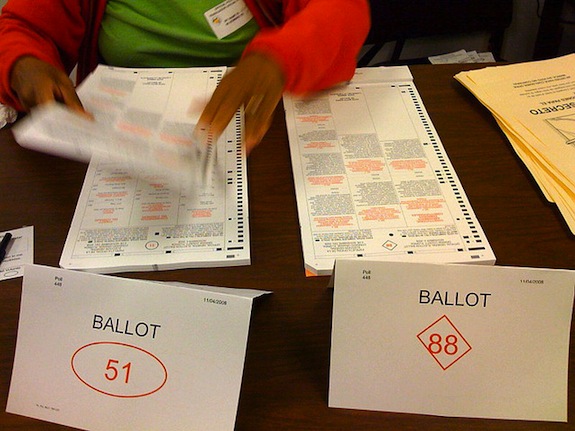
A state investigation turns up little voter fraud evidence, even though controversial reforms in 2011 were aimed preventing fraud. (Photo by Erik Hersman)
By Ashley Lopez
Florida Center for Investigative Reporting
Two years after the Florida Legislature passed a massive and controversial overhaul of its election laws there is still little evidence of widespread voter fraud in the state, even though clamor about fraud was the impetus for the changes in the first place. This week The Miami Herald/Tampa Bay Times reported:
On Friday, the [Florida Department of Law Enforcement] released the results of two more cases involving allegations of voter registration fraud.
In a probe of the Florida New Majority Education Fund, which aims to increase voter registration among under-represented groups, the FDLE concluded it could make no arrests.
In a second probe, involving Strategic Allied Consulting, a vendor for the Republican Party of Florida, an arrest was made of a man who stole the identity of a former girlfriend’s ex-husband. He admitted to fraudulently filling out two voter registration forms. And that was it.
The rather meager findings of both investigations were in keeping with others that have concluded this year. None have found fraud on a significant scale.
In 2011, the Florida Legislature quickly passed a bill that shortened early voting and made it harder for third-party groups to register voters, among many other things.
Much of the reforms were aimed at preventing voter fraud, Republican sponsors of the bill have claimed. The Orlando Sentinel reported in May 2011:
The bill would cut the time for early voting from 14 days to eight. County election supervisors could keep their early voting sites open anywhere from six hours to 12 hours per day.
That would allow a maximum of 96 hours of early voting — the same number allowed today, but over fewer days.
It would also eliminate a long-standing provision that allows people to change their address or name at the polls. Under the bill, changes would be allowed only for voters moving within the same county. Otherwise, a voter would have to cast a provisional ballot and later provide identification to the supervisor of elections.
Other changes would require third-party voter registration groups such as the League of Women Voters, unions and the NAACP to turn in voter-registration cards within 48 hours or face fines. Voter groups have said that requirement would be difficult to meet if they are registering thousands of voters at a time.
Critics have said that will make it harder for college students and minorities who flocked to the polls in 2008 to elect President Barack Obama to have their votes counted in next year’s presidential election.
During that time, however, there was already information about how infrequently the state was handling voter fraud cases. According to the Sentinel, “the Florida Department of State has noted there were just 31 cases of alleged voter fraud referred to the Department of Law Enforcement for investigation between January 2008 and March 2011.” Only two of those cases resulted in arrests.
With these most recent findings from FDLE, the Times/Herald reported that “the paltry findings suggest that the threat of fraud was never as serious as Republicans made it, or that the investigations into fraud have not been thorough enough to find serious wrongdoing… the two cases released Friday could be a combination of both.”
Following extremely long lines at the polls during the 2012 presidential election in Florida, which experts say were spurred by the 2011 elections law, lawmakers were compelled to change the laws once more this year.
Many of the most contested provisions of the 2011 law, which was signed into law by Gov. Rick Scott, were eventually reversed. Upon signing the new voting bill, Scott said, “There were inefficiencies in the 2012 General Election — and our system needed to be corrected… I asked the Legislature to enhance our system of elections and they met the challenge.”
